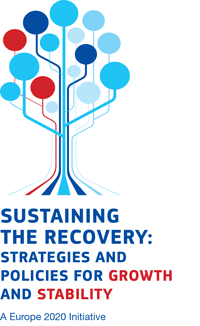
Accessibility tools
Service tools
Language selector
- Current language: en
Navigation path
- European Commission
- Economic and Financial Affairs
- Brussels Economic Forum 2014
- Programme and speeches
- Financing the recovery
Financing the recovery:
The state of Europe's financial sector
Europe has made huge strides in strengthening its financial sector over the past few years, but it still has much more to do to protect against any new financial crisis, panellists at the 2014 Brussels Economic Forum agreed on June 10.
Yves Mersch, member of the Executive Board of the European Central Bank welcomed the recent improvements in financial stability, but added, “To say we have reached a turning point would be a little bit daring.”
Mersch hailed the significant efforts by banks to improve capital positions as part of a broad strategy to reduce risk, and the major efforts in recent years at deleveraging. But the outstanding worries meant that the financial sector could not be described as safe, he said. “We have lingering concerns about earnings outlook and asset quality,” Mersch warned. He also noted that the euro area is not immune to renewed sovereign debt tensions even though much progress has been achieved: “Despite the easing of tensions, we are not protected from a relapse – this remains a distinct but clear possibility.”
Marek Belka, President of the National Bank of Poland, described how the non-euro Central and Eastern European member states, that generally have banking systems with a majority of foreign-ownership, had coped relatively well with the crisis. “Our banks are very well capitalised. They are comparatively small, so the economies are generally not over-leveraged. They are by and large profitable and stable,” he said. Governor Belka estimated that the foreign-owned banks in general "behaved very decently during the crisis, and were good corporate citizens" and that fears at the time of rapid deleveraging and withdrawal of resources to the banks home markets did not materialise.
But that doesn't mean that Governor Belka is relaxed about their situation. He said that while banks in the region remained in good shape, their balance sheets showed that lending was heavily skewed towards households rather than towards business. Governor Belka attributed this partly to the fact that many foreign banks strive to keep operations simple in their CEE subsidiaries, possibly a consequence of high level risk management decisions taken away from the local market into the home country head office.
Maarten Verwey, the European Commission’s Deputy Director-General for Economic and Financial Affairs (ECFIN), said he was pleased that there did not seem to be a generalised problem of credit supply in the EU, but warned that for a number of member states, particularly in the periphery, there might well be credit supply constraints. “There is evidence that credit markets have fragmented,” he said.
Verwey gave a number of policy suggestions. Firstly, although there has been progress to limit the redenomination risk, there was still no room for complacency. Secondly, more action was needed to deal with non-performing loans currently on banks' balance sheet. Thirdly, conditions for cross-border credit should be restored, with more efforts to promote investment, consolidation and credit flows. Fourthly, dependence on bank lending should be structurally reduced. In order to achieve this end Europe needs to deepen its capital markets. And completing the single rulebook for these should be a priority.
Jaime Sáenz de Tejada, the Chief Financial Officer of Spanish bank BBVA, said that from the vantage point of a financial institution there were three overarching priorities. First, trust in banks and the financial system as a whole has to be restored. Secondly, banks should lead the way towards more transparency vis-à-vis regulators and the public. Finally, banks will also have to prepare for a different and more competitive environment. He pointed to Spain’s banking reforms that had dramatically cut the number of financial institutions from 55 to less than 15. “And we did that while adapting to a completely new regulatory framework,” he said.
Sáenz de Tejada said the need to regain confidence meant working with all the different stakeholders, including clients, shareholders (to deliver profitability), and supervisors (to show that the new model can withstand the next crisis). “Prudent behaviour should be pursued by every single bank in Europe,” he said. “We should be happy with what we have done, but we cannot afford reform fatigue.”
Gertrude Tumpel-Gugerell, a former Executive Board Member of the European Central Bank, said that four years after the EU agreed its first stabilisation measures, it was now possible to say that it was halfway through its reforms. “The sovereign bond spreads have come down, but the measures have not fully worked yet as fragmentation is still there,” she said. “We have come very far in the stabilisation of the sector – but growth and jobs need to become visible.” Tumpel-Gugerell’s main recommendation was to find more innovate ways to promote investment. “That means better integrated capital markets, and more cross border banking mergers,” she said.
Summarising the main points of the session, Maarten Verwey pointed out that the three challenges Sáenz de Tejada had mentioned for the banking sector – to restore trust, to give clarity and prepare for a more competitive environment – were valid for Europe as a whole going forward.

Read and subscribe to ECFIN E-news
Vice-President
Olli Rehn website























